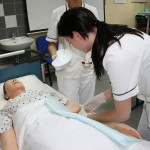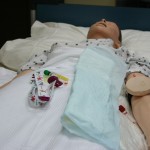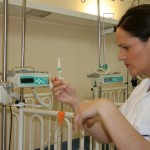Study curriculum | Accreditation [PDF]
As stated in the WHO and EU recommendations and standards, professional highly educated nurses are needed at all levels of health care system (Education Strategy for Nurses and Midwives / WHO, 2003).
The International Council of Nursing (ICN / 1987; 1992) and the European Commission’s Advisory Committee on Nursing (1994, European Directives 89/48 CEE and 92/51 / EEC) have recommended for nurses to be educated in specific fields within which they will be able to deepen their theoretical and practical knowledge to providing as high as possible quality of nursing care in the course of satisfying basic human needs. In accordance to that the Croatian system of health care does not only need nurses with basic knowledge and skills of general nursing care, but an ever larger number of highly educated nurses with knowledge and skills in specific fields of health and nursing care.
An important field within health care that requires specific professional knowledge is the nursing care of psychiatric patients. The extended life expectancy significantly affects the increase in the number of psychiatric disorders; hence it is important to enhance the educational level of health professionals (WHO, 1998).
We live in a time of fast change and accelerated pace of life, stress and dissatisfaction which accompanies disagreement and conflict, failure, different tragedies and losses which lead to deep suffering and feelings of hopelessness– all the aforementioned can affect an individual’s and community’s mental health. The quality of human life is determined by life expectancy of a population in a particular area. Since 1998., according to WHO recommendations, a new standard for determining the quality of life was introduced (disability adjusted life years), i.e. the quality of life is determined by the types of diseases that take away most years of working population life. Listed among the ten diseases that have a significant impact on the working ability are five mental disorders, and the first among them are depression and alcoholism.
In most countries of the worl, mental disordesr are usually not recognized as a cause of suffering , and even death . It is estimated that each year in the world 3 to 4 million people die from malaria, which is alarming, but the same number commit suicide. In fact, every fifty seconds somewhere in the world someone “dies by their own hand” but that type of death is rarely spoken of. Therefore, WHO Department of Mental Health launched a special program 1997, designed to warn about the impact of mental disorders that are becoming more prevalent and have the same fatal consequences as organic diseases. The aim of the program is to provide assistance in the development and support of mental health, human rights and legislation, with the emphasis on the concept of mental health in the community, where every member of the community contributes to the social inclusion of people with mental disorders. W. Rutz, WHO Mental Health Advisor, believes that “mental illness is a reflection of imbalance in the community and the community must be involved in its treatment .” The same author believes that the cost of health, i.e. illness, of those who are ill and who will die is a lot higher than it can be predicted today. Some calculations show (WHO) that up to 40 percent of all the health costs is related to stress, depression and other mental disorders.
In the Republic of Croatia greater and greater attention is given to mental health problems and illnesses. Thi is supported by legislation relating to people with mental health problems (Law on the Protection of Persons with Mental Disorders, 1997.) and awareness of the need for the establishment of the Institute of Mental Health (Croatian National Institute of Mental Health, 2003).
These facts represent one of the reasons for the establishment of professional specialist nursing study program.
The program focuses on the education of nurses for psychiatric patients’ health care, who will be able to provide integral care of psychiatric patients, and within the prescribed competencies.
General information
Teaching institution
University of Applied Health Sciences in Zagreb
Name of the study
Specialist Graduate Professional Study in Psychiatric Nursing
Duration
Two (2) academic years (4 semesters)
Admission conditions
Fully completed 3-year professional study program of nursing; or two-year professional study of nursing and a four-year comparable study program; or two-year professional study of nursing and bridging examinations. State Board Exam.
Job skills and competences
Upon completion of curricular requirements the graduate students will be able to perform nursing practice in health care since they will:
- possess specific knowledge in: contemporary organization of psychiatric services; basics of different approaches in psychiatry, psychopathology, mental disorders and diseases, epidemiology of mental illnesses and factors affecting their formation, ways of preventing or combating disorders and mental illnesses, social and legal status of psychiatric patients and their rights
- possess specific knowledge of clinical psychiatry areas: mental disorders of organic origin, mental and behavioral disorders as a result of psychoactive substance use; schizophrenia, schizoid and other delusional disorders, affective disorders and mood disorders, personality disorders, neurotic disorders as a result of exposure to stress, mental retardation, psychological development disorders, behavioral and emotional disorders in children and adolescents; emergencies in psychiatry; psychopharmacotherapy
- possess specific practical and theoretical knowledge in the field of health care of psychiatric patients
- be able to determine the needs of psychiatric patients and to evaluate the priorities of their care
- be able to implement specific interventions within the scope of their competencies
- be able to evaluate the success of implemented interventions, and monitor the overall performance indicators of treatment and health care
- know how to communicate with a psychiatric patient and their family members
- independently apply therapeutic methods within their competence
- implement measures for improving mental health in the community
Other information
Program Objectives
- 1. Promotion of professional status of nurses:
• Extend the students’ knowledge and skills in the field of nursing care of patients (including the patient’s family and wider social community)
• Develop students’ analytical and critical thinking in order for them to be able to provide the highest quality nursing care (promotion of evidence based practice)
• Enable the students to participate in team work and to collaborate with all other specialists involved in the treatment and care of patients
• Ensure the highest level of education and training, integrated theoretical and practical knowledge, in order to be able to professionally develop through various forms of lifelong learning. - Implementation of general principles of European Network of Nursing Organizations (ENNO) for harmonization of education and training in order to enable free mobility of professionals in EU (the Roman criteria)
- Promotion of harmonized high standards in clinical nursing in EU
Venues for study program implementation
Theoretical classes are held at University of Applied Health Studies in Zagreb and they include:
- Lecture halls with classical and modern audio-visual and multimedia equipment:
– a computer with a projector and internet access,
– an overhead projector, slide projector,
– television, video and DVD player,
– white and blackboards. - 2. IT classroom with the necessary equipment for a maximum of two students per a computer, and the necessary text, graphics, audio, multimedia, simulation and communication software.
- Library – equipped with professional and general literature on medical and social sciences in keeping with the curriculum, professional journals.
Clinical practice is held at:
- Clinical hospital „Dubrava“ – University of Applied Health Studies Psychiatry Clinic
– Psychiatric hospital „Vrapče“, Zagreb
– Clinical hospital „Sisters of Mercy“– Clinic for psychiatry, alcoholism and other addictions
– Clinical hospital centre „Rebro“ – Psychiatry Clinic Rabro
– Clinical hospital centre Zagreb, Clinic for medical psychology
– Psychiatric hospital „Jankomir“, Zagreb
-Psychiatric hospital for children and adolescents, Kukuljevićeva, Zagreb
– Prison hospital in Zagreb
– Neuropsychiatric hospital „Dr. Ivan Barbot” Popovača
– Nursing homes for the elderly with the equipment for the implementation of healthcare
– Retirement home Maksimir
– Retirement home Sveti Josip, Dunjevac
– Rehabilitation centres
– Rehabilitation centre Zagreb
– Demonstration room for nursing care with practice models, University of Applied Health Studies
Evaluation of the study program implementation and efficiency
Successful implementation of the program is evaluated by questionnaire by which students evaluate the usefulness of the study content, the preparation of the teachers for lectures, clarity of instruction and the amount of new content. Study plan and program and its implementation arecompared, as well as the number of students present at the lectures and practical classes: at the end of an academic year there is an evaluation of students’ grades and the level of success at passing their exams.









